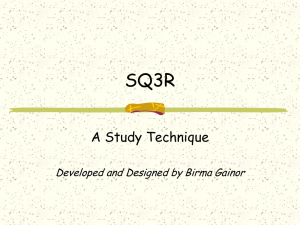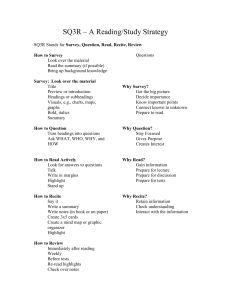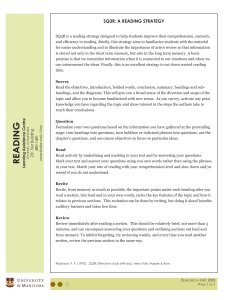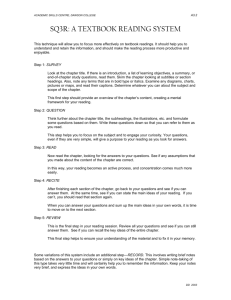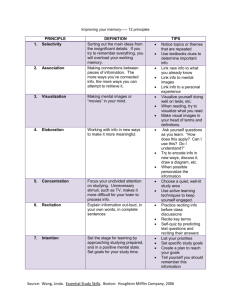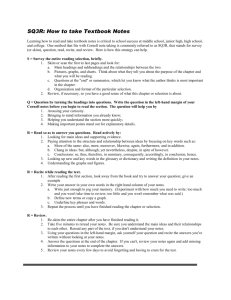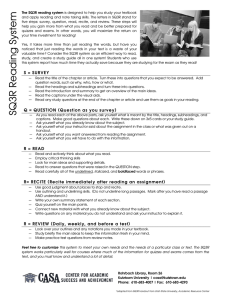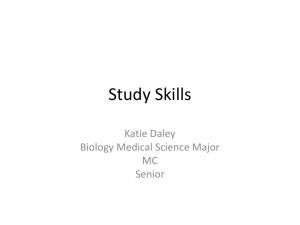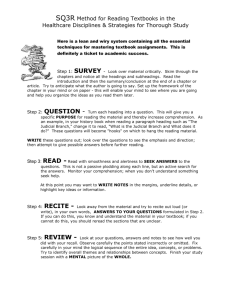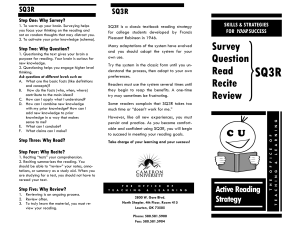Study Skills
advertisement
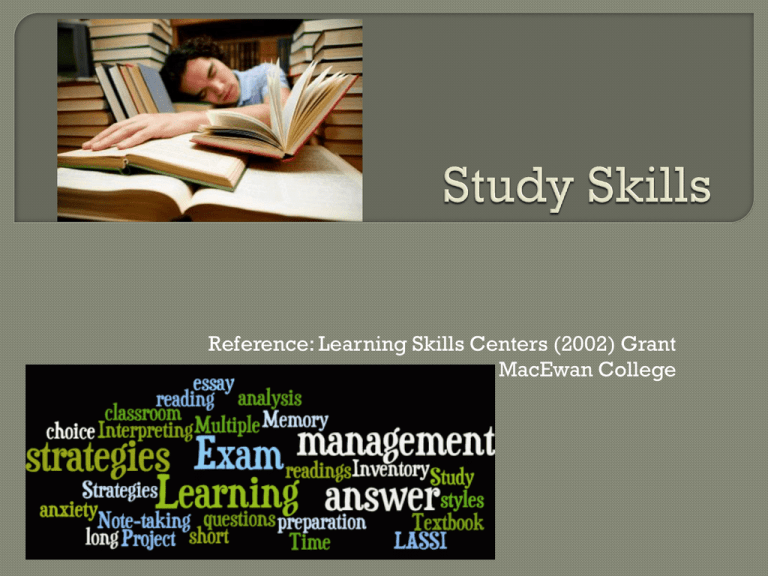
Reference: Learning Skills Centers (2002) Grant MacEwan College 10% of what we read 20% of what we hear 30% of what we see 50% of what we see and hear 70% of what is discussed with others 80% of what we experience personally 95% of what we teach to someone else William Glasser Many students are unaware of the study tips that have resulted from research done on learning and how easy it can be to incorporate these tips into their daily study habits Has a regular study schedule Usually works at the same times each day Works mostly in a regular study place Works for short periods with frequent rest breaks Reviews notes soon after a lecture Does not leave work until the last minute Does not get easily distracted and Does not need exams for motivation 1. Study difficult subjects first because your mind is fresh and alert when you start studying. 2. Leave routine and mechanical tasks for last. Activities like recopying papers or alphabetizing a bibliography for a research paper do not require a high degree of concentration and can be left until the end of your study session. 3. Build into your schedule short break before studying a new subject or when working on one assignment for a long time. 10 min break after 50 min is reasonable or 5 min after 25 min of work. 4. Set aside a time each week to analyze the specific tasks that need to be done in the next week and plan when to do them. 1. 2. 3. 4. 5. Noise, people talking, music, TV Daydreaming Being hungry and tired Personal problems Anxiety called by a course 1. 2. 3. 4. 5. Motivation to learn- view studying as an opportunity to learn Becoming interested- the more you know about a subject the more interested you become Being organized- know exactly what your assignments are and get the materials you need Competing with yourself- set a time when you think you should finish and see if you can beat the clock. Asking questions- listen carefully in class but if you don’t understand an assignment be sure to ask the teacher for further explanation. You can’t remember what you don’t understand. Be actively involved in the lecture, listening carefully and critically to what is being said Record important facts and ideas Learn material and remember it when you review Familiarity with the subject increases your ability to pick out key points and take organized notes during the lecture. 1. Take notes on main ideas, secondary points and important details using the SQ3R method of reading and notetaking. 2. Before each lecture take a few minutes to look over the notes on the lecture from the day before so you can connect them with the lecture you are about to hear. 3. Intent to listen. Decide ahead of time that the lecture will be interesting and worthwhile. 1. 2. 3. Write down the date Make your notes complete and clear enough that they will have meaning for you weeks and months later. Develop abbreviations of common word and reoccurring terms. Be attentive for clues “you’ll see this later” or “this is important”. Make note of this by putting a star next to the concept 4. Do not doodle. Doodling interferes with concentration and breaks eye contact with the lecture, whose gestures and facial expressions give important clues to understanding and remembering. 5. Skip lines to show the end of one idea and beginning of another. 6. Pay close attention to the information at the end of a lecture. Summary statements may highlight main points. As well, instructors will often tell students that certain information is likely to appear on a test. Turn to page 8. Read the two ways of taking lecture notes and write down information on the method that could see yourself using. Review notes for about 5 minutes. Then cover the facts and ideas and RECITE them as fully as you can, in your own words. Uncover the words and verify what you have said. This procedure of reciting is the most powerful learning technique known to psychologists. Remember: unless you have reviewed the material, most students are unable to recall even 20% of the content they learned 24hrs previously; therefore the first review must be done within 24hrs. SQ3R – Survey, Question, Read, Recite, Review Read page 9 and make important notes on each. At least once a day go through your current cards. Go through them 3-4 times Spend no more than 20 minutes at a time on memorization. Pull out the cards that give you problems and go through them again until you have the information correct. In the two to three days before examination, review notes thoroughly. Glance at key words and see how much you can remember before you reread your notes. Use visual imagery if you find it helps you remember lecture material Look for the connection between themes, main concepts and methods presented over the course Read page 11 and write any important information that could help you write multiple choice exams. When it comes to school textbooks remember you cannot write in the books. However these are great ideas to include in your class notes. Copy all info into your notes. Take a look at the examples
